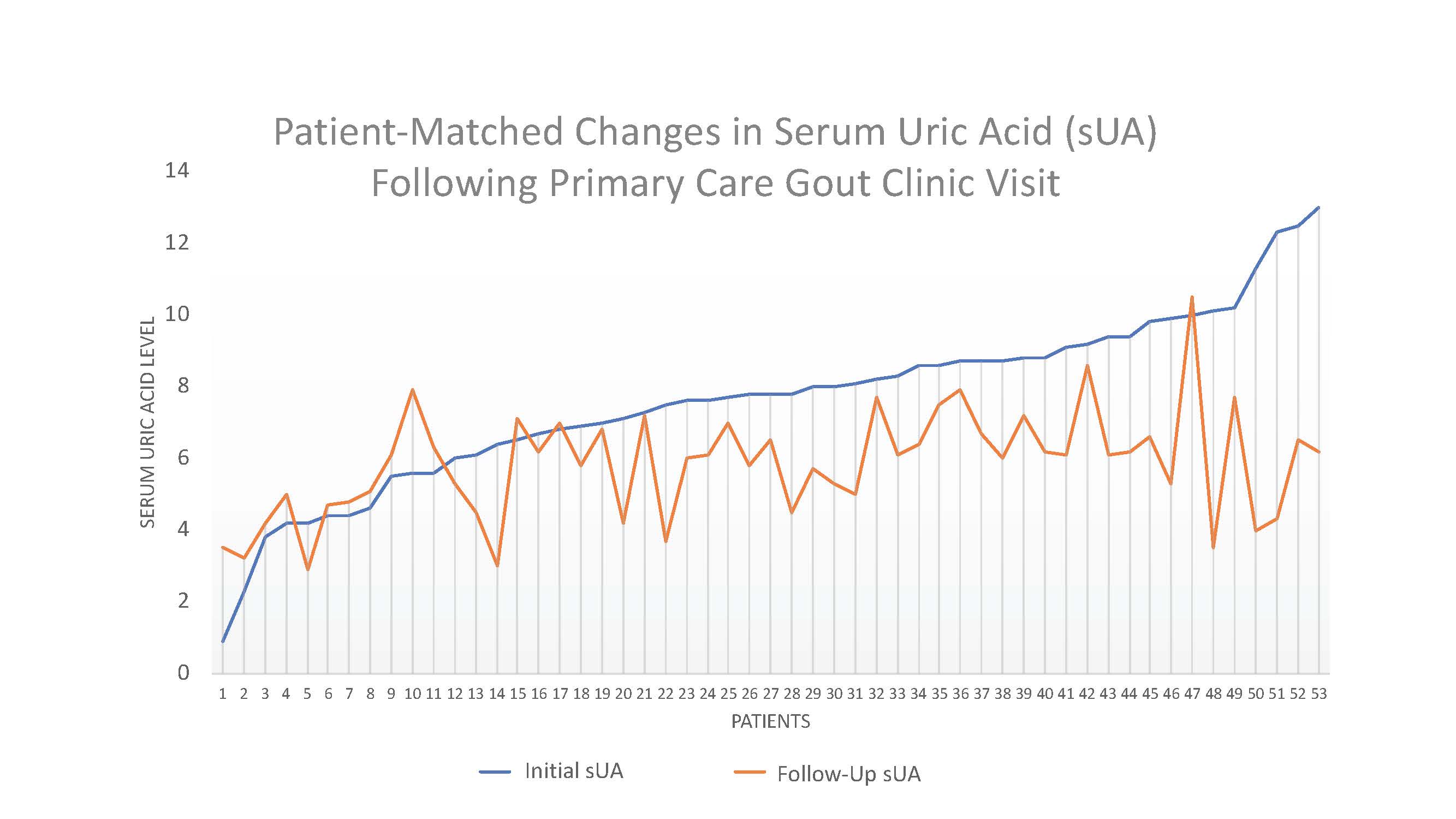Session Information
Date: Sunday, November 10, 2019
Title: Education Poster
Session Type: Poster Session (Sunday)
Session Time: 9:00AM-11:00AM
Background/Purpose: Gout is common in primary care, though patients often have inadequate control or are referred to specialists for evaluation and management. This may be due to limited provider time during routine clinic visits, but may also reflect insufficient preparation of primary care providers (PCPs) in health professions education (HPE). Although excellent clinical training in gout is often provided in rheumatology clinics, learners may not effectively translate the lessons learned in the subspecialty context to primary care.
To increase contact between rheumatologist clinical educators and internal medicine (IM) trainees and to strengthen interprofessional and interdisciplinary collaboration in a new teaching and learning environment, a Primary Care Gout Clinic (PC Gout) was established at a Veterans Affairs (VA) Medical Center affiliated with a large academic institution. The primary purpose was to increase IM trainees’ exposure to the appropriate evaluation and management of gout; a secondary goal was to improve patient access to specialty services while aligning with current medical home models.
Methods: The PC Gout clinic was initiated in September 2017, by a rheumatologist with primary care support, and a dedicated pharmacist with advanced training in primary care. The clinic is held one half day per week, with trainees (mainly IM) and HPE students regularly assigned. Patients are referred to the clinic from other providers in primary care, the emergency department, inpatient medicine, and other services. Clinic experiences emphasize the importance of treating to uric acid targets, understanding the interactions of gout and urate-lowering therapies (ULTs) with common comorbidities such as chronic kidney disease and congestive heart failure, and the value of care delivery using a model of interprofessional teamwork.
Results: One hundred seventy-two visits have been completed since September 21st, 2017, representing 80 unique patients (77 male, 3 female). Demographics, referral source, and trainee type involved in the encounter are shown in Table 1.
Mean serum uric acid (sUA) level at initial visit was 7.6 mg/dL (0.9 to 13.1). To date, 53 patients (66%) have at least one additional measurement; mean post-treatment sUA is 5.8 mg/dL (2.9-10.5). Figure 1 shows the individual-matched changes in sUA for these patients.
Conclusion: The PC Gout Clinic represents an innovative method of connecting rheumatologist clinical educators with HPE students and trainees and creates a new context for teaching and learning. It embeds the rheumatologist and pharmacist—both of whom bring content expertise—within the primary care environment and enhances clinical teaching by increasing specialists’ awareness of learners’ perspectives. In addition, the PC Gout Clinic also improves patient access to appropriate care and helps prioritize specialty referrals.
To cite this abstract in AMA style:
Lebedoff N, Barker A, Koening C, Gallop C, Starman K, Battistone M. Enhancing Medicine Trainees’ Exposure to Gout Diagnosis and Management Through an Interprofessional Approach in the Primary Care Setting [abstract]. Arthritis Rheumatol. 2019; 71 (suppl 10). https://acrabstracts.org/abstract/enhancing-medicine-trainees-exposure-to-gout-diagnosis-and-management-through-an-interprofessional-approach-in-the-primary-care-setting/. Accessed .« Back to 2019 ACR/ARP Annual Meeting
ACR Meeting Abstracts - https://acrabstracts.org/abstract/enhancing-medicine-trainees-exposure-to-gout-diagnosis-and-management-through-an-interprofessional-approach-in-the-primary-care-setting/


